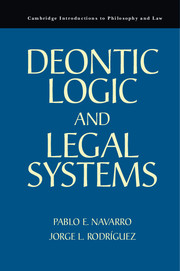Prologue
Published online by Cambridge University Press: 05 October 2014
Summary
Logic and law have a long history in common, but the influence has been mostly one-sided, except perhaps in the fifth and sixth centuries BC, when disputes at the marketplace or in tribunals in Greece seem to have stimulated a lot of reflection among sophistic philosophers on such topics as language and truth. Most of the time it was logic that influenced legal thinking, but in the past fifty years, logicians began to be interested in normative concepts, and hence in law.
From the fourth century BC until the nineteenth century AD, logic was basically Aristotelian logic. Aristotle was not only the founder of logic but also the first to formulate a theory of systems.1 An important result of this influence was the theory of judicial syllogism. The justification of a judicial decision was regarded as a typical case of syllogistic reasoning, where from a normative and a factual premise the decision of the case was inferred by the judge. It was with the Enlightenment that the theory of judicial syllogism became dominant, based on two important ideas: the doctrine of the separation of powers (above all, the separation between the legislative and the judicial power) and a sharp distinction between the creation and the application of the law. The law is conceived of as a set of all general legal norms created by the legislative power (Parliament); the task of judges is limited to the application of the law to particular disputes. But to be able to fulfill this role assigned to judges, the law must provide solutions to all legal issues; it must contain one and only one solution for each legal problem, which entails that the law must be complete and consistent.
- Type
- Chapter
- Information
- Deontic Logic and Legal Systems , pp. ix - xviiiPublisher: Cambridge University PressPrint publication year: 2014

